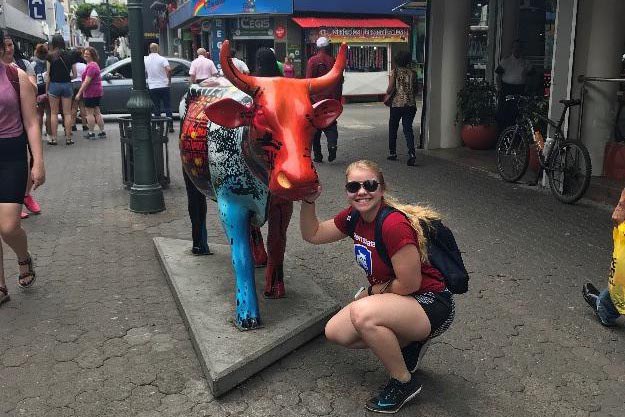Posted: October 21, 2019
My perspective of agriculture has not changed, but merely improved.

The city of San Jose is home to a beautiful statue of a bull that stands in the middle of the street
Growing up in a small agricultural community, commuting to a college 30 minutes from home, and majoring in agriculture isn't exactly an ideal example of stepping out of one's comfort zone. But, when the opportunity to study abroad in Costa Rica fell into my lap, I knew I had to go. My trip to Costa Rica allowed me to explore not only a different country, but so many different agricultural production methods that would not have initially crossed my mind.
Throughout the trip, I found myself looking for all of the little things that make Costa Rica different from central Pennsylvania. One of the major differences I found just so happened to fall along the lines of my favorite class from the spring semester: Soils 101. Costa Rica mainly has an oxic sub-surface soil horizon. Because of this sub-surface horizon, this type of soil would classify as an oxisol soil order. This being said, the soil is highly weathered and high in iron and aluminum oxides. For me, evaluating the soil allowed me to better understand why Costa Rica can only grow certain crops. Pineapples, for example, are an easy crop for Costa Rican farmers to grow. Pineapples need soil with a lot of water movement which is exactly what oxisols provide. Understanding the differences in soil horizons gave me the opportunity to explore one of the many different agricultural production methods practiced in Costa Rica.
The trip itself was an eye-opening experience. Personally, I'm not used to driving down the road without passing at least 6 different corn fields and a couple different herds of cows. Even in the countryside of Costa Rica, there are not nearly as many farms as there are in Pennsylvania. Cities like San Jose encase so much of the country's history. One of the things that I found interesting is that Costa Rica no longer has a military. They pride themselves in the peace they have established. Costa Rica is smaller than the state of Pennsylvania.
For me, the biggest highlight of the trip was a last-minute decision made by our tour guide. He realized that a lot of us were interested in agriculture, so he made a phone call to a friend the morning before we left Monteverde. On the bus, he told us that we were going to visit his good friend's greenhouse. This greenhouse produces the majority of the lettuce and tomatoes used by restaurants in Monteverde. The owner explained to us what kind of soils they use, how they get nutrients to the plants, and how they run their irrigation system. I thought the whole greenhouse set-up was really unique and completely different from any that I have experienced.
This trip allowed me to gain some different skills that I do not think I would have acquired anywhere else. I was really able to build on my communication skills. I had four years of Spanish in high school, which was put to good use. I actually wanted to speak the native language instead of English because it made me feel like less of an outsider. I gained a new confidence from going way outside of my comfort zone. I felt like I belonged in Costa Rica and like I could figure things out on my own. Traveling to Costa Rica also allowed me to gain a new understanding as to how different countries utilize their resources to grow crops.
If I were to describe my experience in Costa Rica to a potential employer, I would have to say that it is truly unforgettable. There was so much to learn and to take in. A lot of the techniques and methods farmers use are things that I would like to share with the farmers in my community. It may not be easy, but I feel that it is definitely worth a shot. There is a lot that can be learned through other countries.
Overall, going so far out of my comfort zone as to go to another country was so worth it. If I had not gone on this trip, I would not have gained or learned as much as what I did. My perspective of agriculture has not changed, but merely improved. This was a once in a lifetime opportunity for me, and it is one that I will not forget.
Ag Sciences Global
Address
106 Agricultural Administration BuildingUniversity Park, PA 16802
- Email globalag@psu.edu
- Office 814-863-0249
- Fax 814-865-3055
Ag Sciences Global
Address
106 Agricultural Administration BuildingUniversity Park, PA 16802
- Email globalag@psu.edu
- Office 814-863-0249
- Fax 814-865-3055

